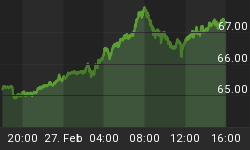In the wake of a 6th consecutive decline in business spending GDP Growth Estimates Tumble, Again.
- The Federal Reserve Bank of Atlanta on Wednesday put its gauge at 0.2%, down from its earlier estimate of 0.3%.
- Morgan Stanley economists lowered their estimate for first-quarter growth to an annualized 0.9% from an earlier forecast of 1.2%, pointing to light inventories and lower capital goods exports as weighing on GDP.
- Economists at Barclays lowered their projection a tenth of a percentage point to 1.2%.
- The forecasting firm Macroeconomic Advisers also trimmed its estimate down to 1.2% from 1.5% before Wednesday. Barclays and Macroeconomic Advisers cited, among other factors, worries that the drop in shipments last month foretells a decline in first-quarter equipment investment.
- J.P. Morgan Chase economists lowered their first-quarter forecast to an annualized 1.5%, from 2%, saying a decline in investment by oil companies -- the result of the plunge in oil prices -- could offset the lift from higher consumer spending.
Optimism Still Rules
Optimism is still the order of the day.
"Overall, given the usual noise in the data, as well as a melange of other special factors, we do not view the 1.5% [First-quarter] tracking as so far below the 2.4% average of the current expansion to raise more serious worries," said J.P. Morgan chief U.S. economist Michael Feroli in a note to clients.
Speaking of optimism, Goldman Trims U.S. First Quarter GDP View to 1.8 Percent from 2.0 Percent.
"Goldman Sachs economist Kris Dawson said on Wednesday he scaled back his view of U.S. growth in the first quarter, following an unexpectedly weak report on domestic durable goods orders in February."
Core Business Orders
Today we learned core business spending, defined as new nondefense capital goods orders excluding aircraft, declined for the sixth month.

Core business spending declined seven months at the beginning of 2012, but nearly all data other than jobs growth has been weak this go around.
The series is somewhat volatile as the following chart shows.

GDP Now Forecast Declines Again
Once again, let's tune into the GDPNow Forecast of the Atlanta Fed.

GDPNow History

The initial forecast on February 2, was 1.9% annualized growth. It is now 0.2% annualized growth. That's quite the plunge in less than two months.
Ominous Trends
I was way ahead of this game. On January 31, I wrote Diving Into the GDP Report - Some Ominous Trends - Yellen Yap - Decoupling or Not?
On Thursday, Fed Chair Janet Yellen met with Senate Democrats at a private luncheon. She told the Democrats that the U.S. Economy is Strong.
[I commented ...]
Several PCE [Personal Consumption Expenditures] items stand out. Is the 2.87% increase sustainable?
Curiously, gasoline added 0.25 percentage points to GDP in spite of rapidly falling prices.
Motor vehicles and parts show rapidly slowing growth since second quarter. That's a trend I expect to continue.
I discussed autos on January 6 in Economists Upbeat Despite 4th Consecutive Decline in Factory Orders; Auto Orders vs. Expectations.
Autos are slowing and so will auto-related jobs. Yet economists believe "Auto sales are expected to reach their highest level in a decade this year, bolstered by strong job gains and cheap gas."
My take: Autos will soon subtract from GDP.
Growth in fixed investment is falling rapidly. Equipment, industrial equipment, and transportation equipment are already in contraction.
Inventories added 0.82 percentage points to fourth quarter GDP. Over time, this series trends to zero, so expect a pull back next quarter.
Rising imports subtract from GDP. Imports actually took 1.39 percentage points from GDP. If oil prices head back up, even modestly, this number could get worse.
Exports added 0.37 percentage points to fourth quarter GDP. But note the trend.
Because of the rising US dollar, export growth is dwindling. Will exports add or subtract to GDP next quarter?
All things considered, this GDP report is far more than a simple snapback from the rapid expansion last quarter.
Canada in Recession, US Will Follow in 2015
Earlier today in Canada in Recession, US Will Follow in 2015, I stated "A Canadian recession is underway. US will follow."
Decoupling or Not?I remain amused by all the pundits who think the US has "decoupled" from the global economy and will grow stronger in 2015.
Let's return to a question I asked above: Will exports add or subtract to GDP next quarter?
I suggest the answer is subtract. Not only are US exports getting more expensive relative to Europe and Japan, the entire rest of the global economy is slowing rapidly. Our biggest trading partner is Canada and Canada is in recession, with a rapidly sinking loonie (Canadian dollar) on top of it.
US RecessionThe US won't decouple, just as China did not decouple from the global economy in 2008-2009 (a widely-held thesis I also knocked at the time).
Indeed, now that virtually no economist expects a US recession, I believe we are finally on the cusp of one, just as the Fed seems committed to hike
Much of this seemed pretty obvious back in January. I suppose it's not obvious because economists still don't see it.
Then again, economists have a perfect track record. They have never once in history predicted a recession.
For a full recap of today's disastrous durable goods report, please see Durable Goods Orders Unexpectedly Decline, Business Spending Declines 6th Month.















